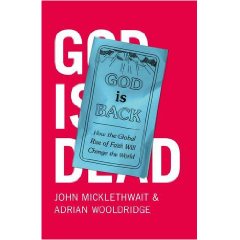 The Equality Bill 2009 aims to simplify and modernise UK anti – discrimination legislation. If passed, it will roll up the rules on a broad range of circumstances, currently covered by diverse legislation, into one Act. If it’s done well (which these exercises often aren’t), it’ll be handy for us lawyers.
The Equality Bill 2009 aims to simplify and modernise UK anti – discrimination legislation. If passed, it will roll up the rules on a broad range of circumstances, currently covered by diverse legislation, into one Act. If it’s done well (which these exercises often aren’t), it’ll be handy for us lawyers.
Over the last month or so there’s been a renewed rumble of concern from within the faith community. What’s the problem? Well, bluntly, it looks like folks are worried that if the Bill is passed as it stands it will undermine the rights of Christian (and other faith) organisations to require that employees share their religious convictions.
The move has been described as a “bid from the marching band of parliamentary secularists to drive religion from the public sphere” by some, whilst one minister in the Equalities Office has admitted churches should be “lining up their lawyers”. So much for balanced discussion.
Much of the media hype around the Equality Bill focuses on concern about restrictions over the selection criteria religious bodies can impose when recruiting employees. It seems to be being suggested that this will be the first time significant constraints will have been introduced. In fact, however, for the most part the Bill restates principles already in operation in the UK allowing religious organisations to place restrictions on those whom they employ or desist from employing, on grounds of religious conviction.
Under the The Employment Equality (Religion or Belief) Regulations 2003, an employer can restrict applications for a job if they can show that a religious belief is a “genuine occupational requirement” of a role – i.e. that one needs to be of that faith to carry out the actual duties required by the individual position. They must also have regard to “proportionality” – i.e. the extent to which that is the case. The effect is that for a job to be protected, faith must be central to the particular duties required for its fulfillment. It’s easy to ensure the job description of a minister is safeguarded, but harder to justify the position for, for example, a church office administrator.
Under the proposed legislation, it would remain the case that organisations could, on grounds of religion, continue to impose restrictions, for example on employing those who don’t share their faith, or on employing women.
So what’s the problem? The Christian Institute in one of a number of concerned bodies. It has (to its credit) taken advice from a QC. The matter of greatest concern relates to the wording of the part of the Bill intended to protect individuals against discrimination based on sexual orientation. It is feared that in proposing new, enhanced protection for individuals against discrimination based on sexual orientation, the Bill may erode a church’s freedom not to employ someone on those grounds.
Under the proposed wording of paragraph 2(8) of Schedule 9, the Bill, if passed, will prevent churches from refusing to employ someone on grounds of sexual orientation unless the job in question “wholly or mainly” involves leading worship or teaching doctrine. Churches fear that, for example, were a minister to be asked to leave their post because they were in a gay sexual relationship, then unless the church could show that at least 51% of their time was spent in conducting worship or teaching doctrine, they would be prevented from dismissing him, or from refusing to hire him in the first place.
However, what most people seem to miss is that because religious employers already benefit from protection similar to that under the 2003 Regulations, this would only ever arise in a very small subset of situations. The nub of the issue is a very short point indeed: that a religious body might be prevented from refusing employment to a professing member of their religion solely on the basis of sexual orientation or conduct, unless that person’s main job was to lead worship or teach doctrine.
Viewed in that light, perhaps the sting is taken out of the religious campaigners’ tail?
What I will say is this. Having spent hours getting my head around a long and very complicated Bill, I can vouch for one thing: it is not straight forward. Therefore it is understandable that there are misleading rumours making the rounds. In my view, those on all sides would be well advised to be rather cautious about jumping in at the deep end before ensuring they understand the nature and extent of the issues involved. Maybe I’m dismissing the rumpus too hastily…perhaps this is all, indeed, all very worrying and I have myself misunderstood the legislation – in which case I hope you’ll correct me. As an evangelical christian I am, as you might expect, interested to preserve my freedom to exercise my faith, and my church’s freedom to employ only those who share it. That said, I remain unconvinced that this Act is a serious threat to that. If you think differently, I’d be interested to read why. Comments welcome.



 In Texas yesterday another life ended in the USA’s most-used death chamber.
In Texas yesterday another life ended in the USA’s most-used death chamber. God thrives in the midst of healthy competition. Arguments and stances against God can turn out to be some of the best adverts for him. In the UK, you only have to look at the media coverage generated by arguments by people like Dawkins and the London Buses campaign against God’s existence to see people who might never otherwise have stopped to think about it pause to consider what they really believe. Meanwhile, in countries like as China, where Christianity is outlawed, despite persecution of Jesus’ followers there’s evidence of some of the most remarkable church growth seen anywhere.
God thrives in the midst of healthy competition. Arguments and stances against God can turn out to be some of the best adverts for him. In the UK, you only have to look at the media coverage generated by arguments by people like Dawkins and the London Buses campaign against God’s existence to see people who might never otherwise have stopped to think about it pause to consider what they really believe. Meanwhile, in countries like as China, where Christianity is outlawed, despite persecution of Jesus’ followers there’s evidence of some of the most remarkable church growth seen anywhere.